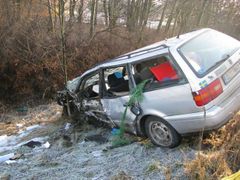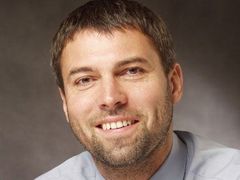STAKES ARE HIGH in the upcoming presidential election, set for February 8. One man to know this only too well is the Prime Minister Mirek Topolánek who told Aktuálně.cz in an exclusive interview his days may be numbered if the incumbent head of state and the chairman emeritus of his own Civic Democratic Party (ODS) Václav Klaus fails to get re-elected.
Mr. Topolánek is far from panicking, though. He considers the doomsday scenario unlikely, as he believes most of the lawmakers who will be electing the head of state in February, will stick with "the enemy they know" and shun his politically uninitiated challenger, Professor of Economics at the University of Michigan Jan Švejnar.
The Czech public knew little of Mr. Švejnar, who went to exile in 1970 and never really came back, until he stepped into the battle for the Prague Castle late last year, backed by the main opposition Social Democratic Party together with the Green Party, a junior member of the ruling coalition. Over the last couple of weeks, though, his popular support has been steadily growing as he tours the country and meets the locals.
However, it is not the common folk who will do the voting but their elected representatives in the parliament. And there, his charm offensive doesn't seem to be working to the same effect. The proof has been offered last Monday by the Christian Democratic Party, which together with the Greens and Civic Democrats makes the ruling coalition, as it announced it would recommend to its lawmakers that they vote for Mr. Klaus.
But the odds may yet change and it will be interesting to watch the two candidates duking it out during a pre-election debate, to be held on January 29 in the Senate. Mr. Klaus, for a long time adverse to the idea of holding a direct debate with his rival, finally said yes - to show he has nothing to fear. And as the TV cameras will likely be present in the Senate for the occasion, the public might in the end get what it wanted all along.
---
The Czech police released complete road accident statistics for the year 2007 last week. As one might suspect, it makes for a rather somber reading. There have been 182 736 incidents recorded last year, which claimed lives of 1123 people, an increase of 167 compared to the year 2006.
It means that eight hours won't pass in the Czech Republic without a person dying as a result of a car crash (not to speak of the "collateral damage" among the animals). Just in case you were interested the US military lost 901 enlisted men in Iraq over the twelve months of 2007. Gee, it's like war out there on the Czech roads! Somebody call for reinforcements!
---
Talking about the Americans and military: there was an interesting moment last week as two Yanks crossed each other's paths (well, actually made sure not to) in Prague, each on a very different mission concerning the very same issue: the proposed US radar in Brdy region, which is to make the Czech Republic part of the missile defense system deployed by the Americans in various parts of the world to protect "x" from "y".
If you want to make the unknown known in the above-mentioned equation, read all about General Henry Obering's visit and the coincidental (or so the two gentlemen claim) presence in Prague of his nemesis, former Undersecretary of Defense Philip Coyle. But don't be surprised if you find yourself confused after going through the arguments of both sides. Can't say you haven't been warned!
---
Would you believe somebody can actually call the Czech Republic "a deeply conservative land with firm traditions"? Well, somebody did last week and they had a good reason to do so: as the investigation of an undercover team of BBC reporters showed, many Czech child care homes are breaking law and violating the country's obligations under the European Convention on Human Rights by housing youngsters with severe mental and physical disabilities in so-called cage-beds.
The idea that millions of people around the globe saw and/or heard the story on BBC (TV, radio and web-site) did not go well with the Minister of Labor and Social Affairs Petr Nečas, who had some harsh words for the BBC journalists and defended the practice. But as Aktuálně.cz reporters showed (both before and after the BBC report went on air), the use of cage-beds is far from necessary, and it can easily be substituted with less drastic measures, provided there is enough good will among the staff of the care homes.
---
Last Wednesday marked the 39th anniversary of Jan Palach's self-immolation. It is highly questionable he would feel proud that Neo-Nazis now consider him their hero. Yet, those very words were uttered by one of the speakers at last Saturday's gathering of far-right extremists in the center of Prague.
The young Czech ultranationalists not only believe that their country is being over-run by "Albanian gypsies selling drugs to our children" (another quote from a speaker at the rally), but that the authorities are being complicit in this by doing nothing aside from "denying (the angry young nationalists their) freedom to speak."
The rally in Palacký Square, the Czech capital's Speakers' Corner where one can publicly address a crowd without having to ask for permission, was quickly organized as a Plan B after the mayor of Pilsen banned a rally in the West Bohemian Beer-Metropolis, where Neo-Nazis intended to march past the city's Great Synagogue, second biggest in Europe, on the the 66th anniversary of the first Jewish deportation to the Nazi concentration camps.
Seen from the perspective of the mostly black-clad, face-covered group, Pilsen thus joined the ranks of the freedom-of-speech hating cities, where Prague has been listed since last November, after it decided to ban a planned march through the streets of its historic Jewish Town, on the anniversary of a 1938 Nazi pogrom against Jews which became known as the "Kristallnacht".
It remains to be seen whether the young extremists will try to raise a legal complaint, as some predict they might since The Supreme Administrative Court of the Czech Republic confirmed late last year it is not up to city halls to decide who has the right to march and who has not.
---
Before we sign out, let's give awards to The Winner and The Loser of the last week. Nothing scientific about this, I assure you, we'll hand them out rather haphazardly. But you might find it easy to agree with the selection of the richest Czech Petr Kellner as a big-time winner, as he just passed the hurdle of making what may very well be the deal of his life.
As for the less fortunate awardee of the week, you might want to shed a tear for the film director Jiří Menzel who will not be getting another Oscar for the best foreign language film next month in Hollywood as we all hoped he would. His latest flick I Served the King of England did not make the final short-list despite dominating last year's Czech Lion annual film awards with four trophies including the ones for best film and best director.












